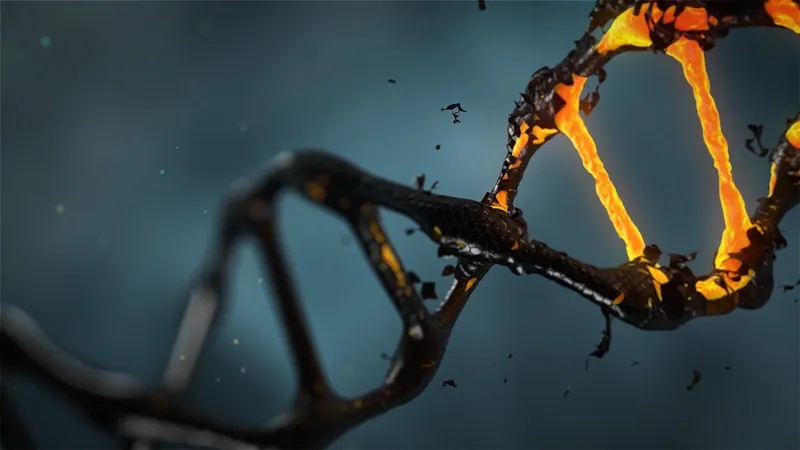
Breakthrough AI Tool Revolutionizes Protein-Protein Interaction Mutations, Opening Doors to New Disease Treatments!
2024-10-24
Author: Nur
Introduction
A groundbreaking new artificial intelligence tool, named PIONEER (Protein-protein InteractiOn iNtErfacE pRediction), has been developed by a team of scientists from Cleveland Clinic and Cornell University. This innovative software and web database are set to transform the landscape of drug discovery by simplifying the identification of crucial protein-protein interactions that could lead to effective treatments for numerous diseases.
Significance of PIONEER
In a recent publication in *Nature Biotechnology*, the researchers showcased PIONEER's capabilities by pinpointing potential drug targets for various forms of cancer and other complex ailments. The need for such a tool is underscored by Dr. Feixiong Cheng, Ph.D., the study co-lead author and director of Cleveland Clinic's Genome Center, who notes that while genomic research is essential in discovering new drugs, it often lacks the necessary depth for advancing to clinical applications. On average, it takes 10 to 15 years to transition from discovering a disease-causing gene to initiating clinical trials.
Complexity of Protein Interactions
Dr. Cheng explained that the logic seems simple: mutated genes lead to mutated proteins. The goal is to create molecules that thwart these disruptive proteins from interacting with healthy ones. However, the reality is far more complex, as one protein can interact with hundreds of others, forming an extensive network known as the interactome. This complexity only increases when disease-related mutations enter the picture, with multiple mutations potentially leading to the same disease.
Challenges in Drug Development
The sheer volume of possible disease-causing interactions is daunting for drug developers. To tackle this challenge, Dr. Cheng collaborated with Dr. Haiyuan Yu, the director of the Cornell University Center for Innovative Proteomics, to harness artificial intelligence in cutting through the vast data deluge. PIONEER integrates data from nearly 100,000 individuals with disease-causing mutations, 16,000 three-dimensional protein structures, and interaction data from nearly 300,000 protein pairs.
Empowering Researchers
This advanced database now empowers researchers to explore the interactome across more than 10,500 diseases, ranging from rare conditions like von Willebrand Disease to more common ones like alopecia. With PIONEER, researchers can input disease-associated mutations and receive a prioritized list of relevant protein-protein interactions ripe for therapeutic exploration. Furthermore, scientists can also search by disease name for lists of interactions that warrant further investigation.
Validation and Outcomes
The team has already validated their predictions in laboratory settings, creating roughly 3,000 mutations on over 1,000 proteins and studying their effects on approximately 7,000 protein interactions. Encouraging preliminary work is underway to develop treatments for lung and endometrial cancers. Notably, their research revealed that specific protein interactions could accurately forecast survival rates for various cancers, including the rare and aggressive sarcoma, and predict responses to anticancer drugs extracted from large pharmacogenomics databases.
Promising Findings
One particularly promising finding was the interaction between the NRF2 and KEAP1 proteins, which was linked to tumor growth in lung cancer. This discovery offers a new target for the development of targeted cancer therapies.
Looking Ahead
Dr. Cheng highlighted the significant barriers posed by the resources required to conduct interactome studies, expressing hope that PIONEER will mitigate these challenges, allowing more researchers to contribute to advancing new therapeutic strategies. With its potential to revolutionize the identification of drug targets and accelerate the pace of drug discovery, PIONEER stands as a beacon of hope in the ongoing battle against complex diseases.
Conclusion
Stay tuned—this AI breakthrough may be the key to unlocking cures for the most challenging health crises yet!

 Brasil (PT)
Brasil (PT)
 Canada (EN)
Canada (EN)
 Chile (ES)
Chile (ES)
 España (ES)
España (ES)
 France (FR)
France (FR)
 Hong Kong (EN)
Hong Kong (EN)
 Italia (IT)
Italia (IT)
 日本 (JA)
日本 (JA)
 Magyarország (HU)
Magyarország (HU)
 Norge (NO)
Norge (NO)
 Polska (PL)
Polska (PL)
 Schweiz (DE)
Schweiz (DE)
 Singapore (EN)
Singapore (EN)
 Sverige (SV)
Sverige (SV)
 Suomi (FI)
Suomi (FI)
 Türkiye (TR)
Türkiye (TR)